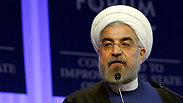
Shuffling nuclear agency. Rouhani.
צילום: רויטרס
Iran admits nuclear agency reshuffle to pave way for talks
Rouhani administration moves to remove hardliners opposing negotiations with the West; Iranian official accuses hardliners of politicizing nuclear issue.
President Hassan Rouhani's government confirmed rumors on Monday it had reshuffled the leadership of Iran's atomic agency to sideline nuclear experts opposed to talks on its atomic program with the West.
Rouhani and his negotiators have been under intense pressure from Islamic hardliners opposed to the talks with the United States and five other powers seeking greater transparency in the program in return for an end to sanctions against Iran.
As the talks move toward a possible deal by late July, the hardliners, many of them hold-outs from the administration of former President Mahmoud Ahmadinejad, have stepped up their campaign, accusing Rouhani of capitulating to the West on a question of national pride and revolutionary identity.
Related stories:
- Iran to produce comprehensive account of nuclear program
- Iran, world powers to start work on nuclear drafts next month
- Iran's nuclear chief: Dispute over Arak 'virtually resolved'
Among rumors circulating for weeks was the alleged expulsion of several nuclear scientists from Iran's Atomic Energy Organization in connection with the 5+1 talks.
After long evading the sensitive issue, a spokesman for the agency finally offered an answer on Monday.
"Only a limited number of people were concerned and they were neither scientists nor were they fired," said Behruz Kamalvandi, a liaison between the nuclear agency and national parliament. His comments, made to radical Islamic students in a Tehran University, was carried by the official news agency IRNA.
"If a boss doesn't have the authority to shuffle around a few among his 15,000-strong personnel, he shouldn't be called a boss," he added, accusing hardliners of exploiting the nuclear issue for "political gains and to win seats in parliament."
"Why do you politicize the issue? Let's stop nagging and avoid destroying each other so we can reach our goals on the international arena," said Kamalvandi, charging that "some people are taking the lead from the supreme leader," Ayatollah Ali Khamenei, on the nuclear issue.
Comprehensive account
Khamenei, who wields unmatched power in Iran's Islamic system, has cautiously endorsed the talks, but insisted Tehran keeps rights to uranium enrichment for scientific research.Earlier on Monday, Kamalvandi said Iran was drafting a comprehensive account of its nuclear activities, but did not clarify if it would be published or deal with the talks underway to resolve the decade-old nuclear dispute.
The project, however, could meet Western demands for greater openness in Iran's atomic operations to allay concerns about its possible military nature.
"There are various files on our atomic program, but we're lacking a comprehensive document, which we are writing now," he said. "This is time-consuming, as we need to coordinate with other government bodies, but we hope to have it finished in eight months."
This timeframe would take the report past the July 20 deadline for the conclusion of the talks between Iran and six world powers - the United States, France, Germany, Britain, China and Russia.
Iran says the program is solely for civilian purposes such as electricity generation. However, Western powers note that some elements of the program have been concealed in contravention of international agreements.
These include the Fordow plant, built inside a mountain, whose existence was only disclosed in 2009 after Western spy services detected it.
After four rounds of talks, Iran and the major powers are due to meet again at expert level in New York on May 5-9 to start writing the final draft of a nuclear deal.










